November 23, 2022 - No. 48
Significance of U.S. Midterm Election Results
People Take Initiatives and Also Remain
Angry and Dissatisfied
• Brinkmanship and Revenge on Congress
Agenda,
Not Governance
• Escalation of Dangerous Factional
In-Fighting and
Rivalry Forebode Civil War
• New Candidates Emerge to Challenge Trump
Significance of U.S. Midterm Election Results
People Take Initiatives and Also Remain
Angry and Dissatisfied

Antiwar protest in
Minneapolis, MN, October 15, 2022.
A main result of the midterm elections in the United States is that people across the country remain angry and dissatisfied with where the country is headed. The midterms did nothing to provide hope or unifying solutions or a sense of change that favours the people.
The undemocratic nature of the midterm elections was also evident in the turnout of 47 per cent, less than half the population voting yet said to be a "high" turnout. Those elected commonly received 25-30 per cent of the eligible vote. It is especially evident when the vote count was very close, as many were for the midterms, sometimes with a difference of only one to three percentage points.
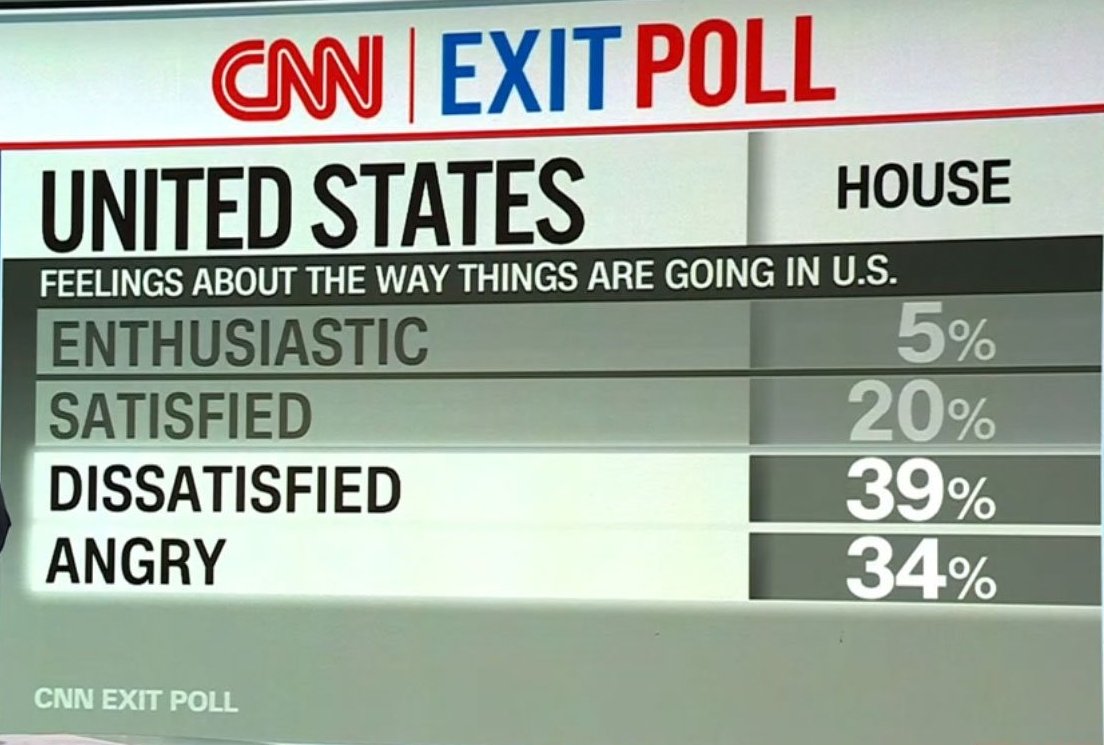 A CNN exit poll, for example, showed 73 per cent of voters
remain
dissatisfied with "the way things are going" in the country, with 34
per cent of those angry. That level of anger and dissatisfaction is
also likely representative of the 53 per cent of the voting age
population that did not vote.
The exit poll is also consistent with other polls showing a large
majority dissatisfied with the direction in which the country is
headed. They need and want a pro-social direction, not the current
pro-war anti-people direction.
A CNN exit poll, for example, showed 73 per cent of voters
remain
dissatisfied with "the way things are going" in the country, with 34
per cent of those angry. That level of anger and dissatisfaction is
also likely representative of the 53 per cent of the voting age
population that did not vote.
The exit poll is also consistent with other polls showing a large
majority dissatisfied with the direction in which the country is
headed. They need and want a pro-social direction, not the current
pro-war anti-people direction.
Numerous strikes and struggles by the people in this same period also indicate the drive for a new direction. This includes strikes by workers at 111 Starbucks stores on Red Cup Day, one of Starbucks' busiest days. Like health care workers, teachers, and many others, they are striking for improved wages and increased staffing and demanding that Starbucks bargain with their union, Starbucks Workers United. Railway workers are also on the verge of striking December 6, as four of the main unions have rejected contract proposals that do not meet their demands for safe working conditions, including safe scheduling and paid sick days.
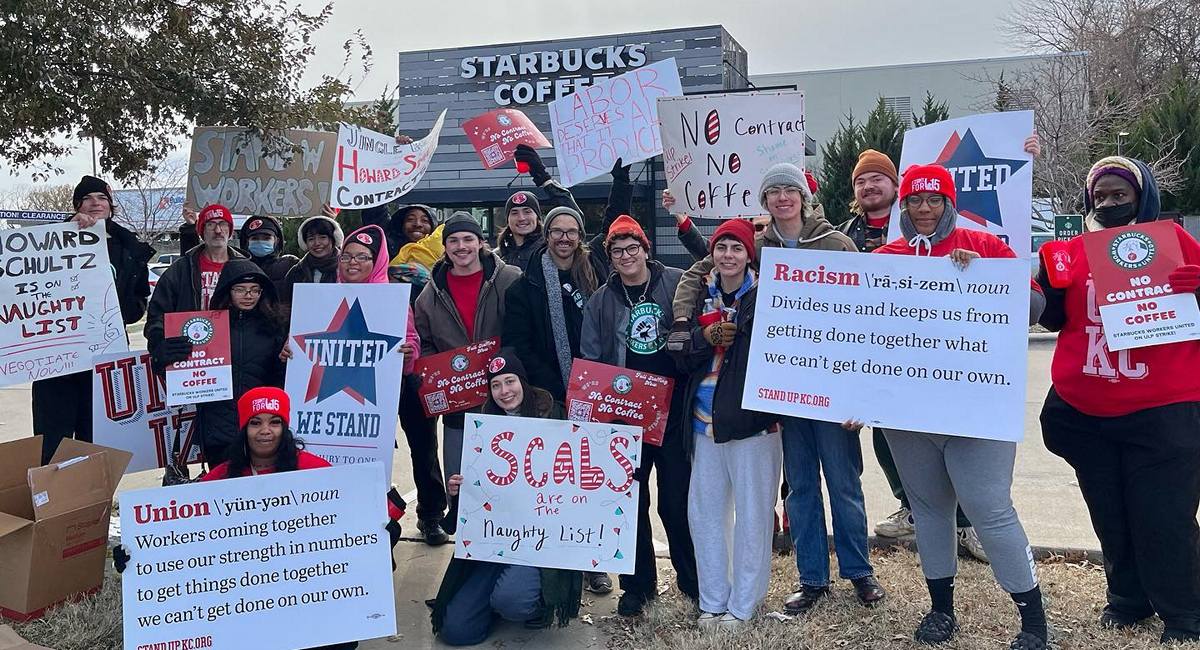
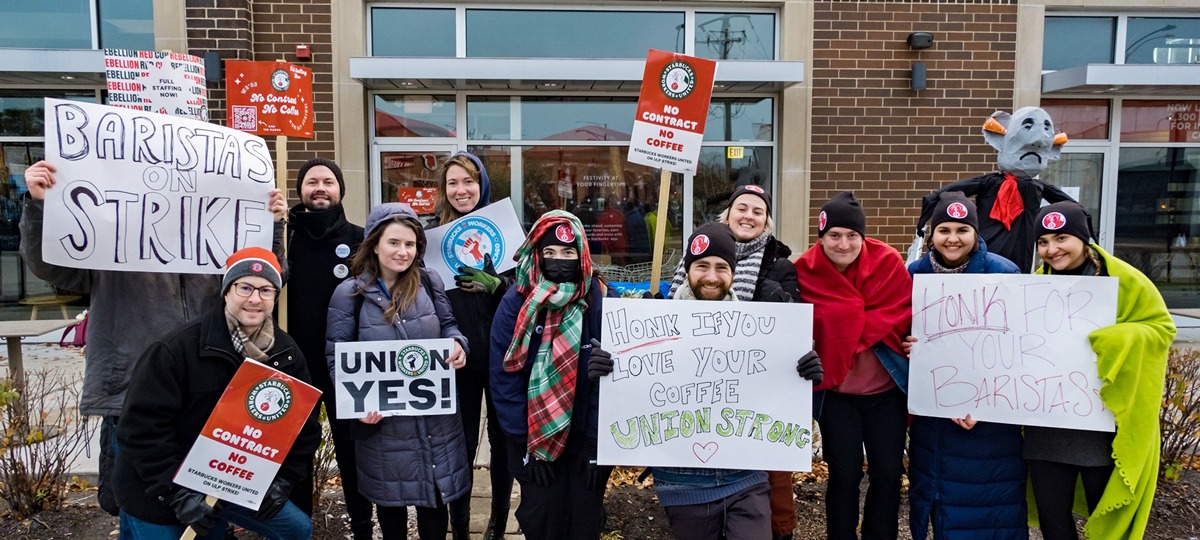
Strike by Starbucks workers in Kansas
city (top) and New York, two of 111 strikes on Red Cup Day, November 17, 2022.
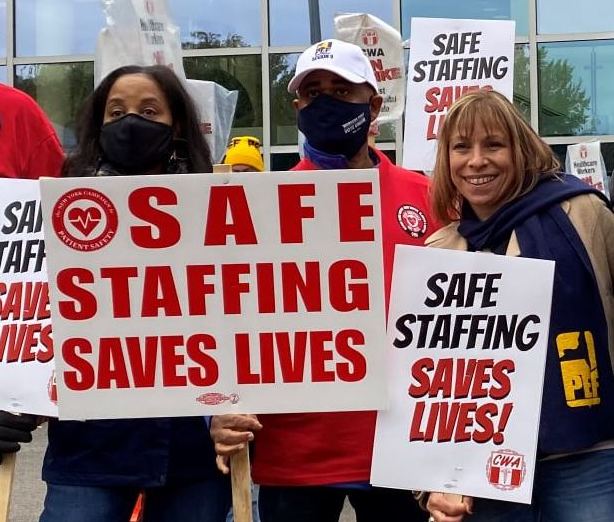 More
than 60 antiwar demonstrations took place in cities across the country
in October, including demands to stop funding war and fund the programs
which provide for the people. Nurses have also been organizing and
striking for safe working conditions, increased staffing, and a federal
standard
necessary to meet the needs of nurses, staff, patients and their
communities.
More
than 60 antiwar demonstrations took place in cities across the country
in October, including demands to stop funding war and fund the programs
which provide for the people. Nurses have also been organizing and
striking for safe working conditions, increased staffing, and a federal
standard
necessary to meet the needs of nurses, staff, patients and their
communities.
A further indication of the direction people are striving for is seen in the results of various ballot questions in the states. Getting issues on the ballot requires organization and persistence. Petition requirements are difficult and vary from state to state. The undemocratic nature of the current system means only 26 states allow for ballot questions. Many state legislatures have ensured that their state does not permit ballot questions. Others ensure they are not binding, and only eighteen allow for changes to the state constitution through ballot questions or referenda.
Between 1996 and 2022 there have been 28 minimum wage increase initiatives on state ballots, 26 of which passed. This year, in Illinois, people voted to amend the state constitution to guarantee that workers have a right to organize and bargain collectively, a clear rejection of anti-union organizing, such as by Amazon and other monopolies. Nebraskans voted to raise the minimum wage from $9 to $15 an hour by 2026 and to raise it each year based on inflation rates. Many workers fought for the increase, including about 20 per cent of state workers.
Nevadans voted to extend an increase in the minimum wage from $10.50 to $12 an hour to nearly all workers. The existing tiered minimum wage system that penalized workers at companies that offer health insurance will also be eliminated. Voters in Washington, DC overwhelmingly voted to triple the minimum wage for tipped workers from $5.35 to $16.10 an hour by 2027, bringing them on par with other workers. In the Seattle suburb of Tukwila, 82 per cent voted to raise the local minimum wage to $19 an hour by next year, one of the highest in the country.
The federal minimum wage remains at the below poverty-level of $7.25. Current poverty level annual income for a family of four is $27,750. Given increases in rents and utilities, it is estimated that $25 an hour is needed for a family of four just to pay for a modest one to two bedroom apartment. That is the minimum wage being demanded by workers across the country.
 The
anger with the vicious attack on women by the Supreme Court, with its
recent ruling against women's health care and abortion rights, meant
people in several states organized to put the issue on the ballot.
These efforts follow the defeat of an anti-abortion amendment in Kansas
in August.
The
anger with the vicious attack on women by the Supreme Court, with its
recent ruling against women's health care and abortion rights, meant
people in several states organized to put the issue on the ballot.
These efforts follow the defeat of an anti-abortion amendment in Kansas
in August.
Exit polls indicated that about 60 per cent of midterm voters stand for having abortion legal. In Kentucky, with some of the most restrictive laws, an anti-abortion amendment was defeated. Doing so clears a path for abortion access to be restored in the state. In Michigan, voters approved a ballot initiative that will put the right to abortion in the state constitution -- preventing a 1931 abortion ban from taking effect. California and Vermont also approved amendments to their state constitutions that will protect abortion rights.
For other states, like Pennsylvania, Wisconsin and Arizona, the Governors elected are likely to veto potential anti-abortion legislation. Arizona, for example, is trying to bring back a 1901 law to ban abortions. Governors can veto legislation and overriding a veto requires a 2/3 majority vote of the state legislature.
Women across the country have been leading the fight for the recognition of the right to health care for all, including the specific rights of women to be provided with all they need to give birth to and nurture the next generation. Women, their daughters, and granddaughters, given their experience of being considered things to be disposed of, even killed, based on government actions, are rejecting the existing democracy of the rich and looking to and working on building alternatives.
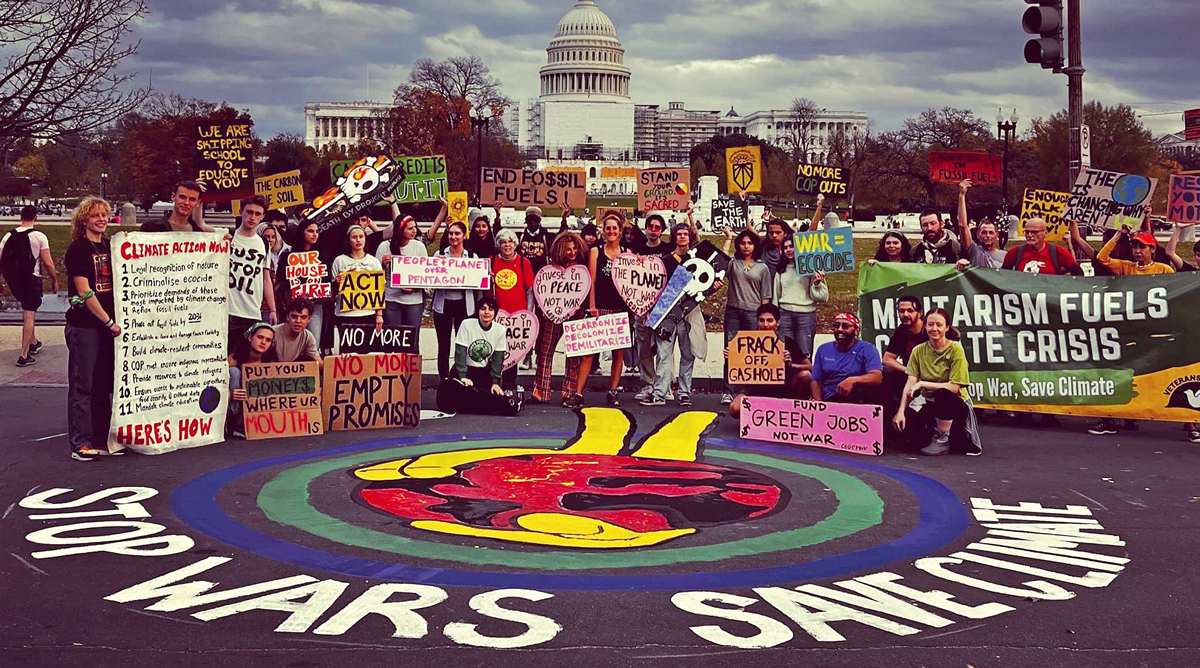 Antiwar protest in Washington, DC,
during day of action for climate justice, November 12, 2022.
Antiwar protest in Washington, DC,
during day of action for climate justice, November 12, 2022.
Voice of Revolution is a publication of the U.S. Marxist-Leninist Organization.
Brinkmanship and Revenge on Congress Agenda, Not Governance
The make-up of the 100 member U.S. Senate remains the same, 50-50, with the possibility of another Senator for the Democrats with the run-off election in Georgia December 6. Georgia is one of the few states that require a candidate to secure 50 per cent plus one of the vote. None did so and the run-off will now have the two candidates who received the most votes, incumbent Raphael Warnock, and challenger Herschel Walker.
The final results for the House of Representatives are not yet in but so far it is 219 Republicans to 212 for Democrats. It is worth noting that neither force acts as a political party but rather as part of a cartel system of factions where alliances shift, and revenge and brinkmanship are paramount. There is no longer even any semblance of governing for the public good. Given that 218 is needed for a majority of the 435-member House, one can readily see that a handful of representatives from the Biden or Trump factions, banding together or separately, can act to block legislation, launch or block investigations, committee appointments, etc. A main result then is that Congress will be even more dysfunctional and more openly preoccupied with revenge.
Already, pro-Trump incoming heads of committees made clear that one of the first orders of business is not dealing with inflation, impoverishment, growing inequality, rights to health care and housing, environmental destruction and the heat waves, flooding and fires that go with it. No, the first order of business is to go after Hunter Biden and through him President Biden.
Kevin McCarthy, elected as head of the Republicans, also announced he will not allow Representative Ilhan Omar of Minnesota to serve on the Foreign Affairs Committee because of her support for Palestine. Californians Adam Schiff and Eric Swalwell are also to be blocked from committees. It is not clear whether McCarthy will have the votes to remove them.
To be elected as Speaker of the House, the top position, McCarthy needs a majority of 218 votes. But in the elections to lead Republicans, 31 voted against him. There is little doubt that for the election for Speaker, as well as for legislation, securing the votes needed will not be easy, which will increase the corruption and back room deals necessary to do so.
The whole situation, with its focus on revenge and brinkmanship, is only further angering the people and making clear that the existing constitutional order no longer functions. A new direction and new constitution are needed, and this necessity is on the minds of many as they organize to defend their rights.
(Voice of Revolution)
Escalation of Dangerous Factional In-Fighting
and Rivalry Forebode Civil War
The midterm election did nothing to resolve the intensifying conflicts among the ruling factions as they vie for the power of the presidency. Resolving conflicts short of civil war is a main role elections were originally designed to play. But with the dysfunction of the existing institutions, they no longer do so, just as they no longer maintain the illusions of democracy in the eyes of the people. It is a serious crisis for the rich and one they cannot solve, making them increasingly desperate.
The ongoing brinkmanship and splintering of factions indicate that the potential for open, violent civil war is increasing. Already, in preparation for the 2024 presidential elections, efforts are being made to engage working people in the debate over choosing candidates from among the rulers, something that diverts from the striving of the people to create a democracy that serves their interests.
Donald Trump officially announced his bid for the presidency November 15, a week after the November 8 election and while the final outcome was still undecided. He gave his usual reason for running, "to make America great and glorious again." He maintains an organized base, including among Christian fundamentalists and those like the racist neo-Nazi Oath Keepers and Proud Boys, who are used to foment divisions and target resistance among the people, such as the broad protests against police racist killings.
The Department of Justice then continued the brinkmanship characteristic of the Biden presidency November 18 by appointing a special counsel to continue the investigations into Trump concerning his January 6, 2021, coup attempt and his removal of sensitive government documents from the White House. The two criminal investigations will now be combined. Attorney General Merrick B. Garland said he made the appointment, after long saying it was not necessary, because Trump declared his candidacy and Biden might run and he wanted no appearance of partisanship. Garland previously said that not appointing a special counsel would show the public that the Justice Department operates above partisanship. Now he is saying it cannot do so, as it would appear to be acting to target a political rival of Biden's, which of course it has been doing all along.
The talk about partisanship also ignores that the Justice Department is notorious for its partisanship to the private interests of the oligarchs, rightly earning itself the name Injustice Department. And while he appointed a special counsel, Garland still has final say.
Yet another debate the people are to be drawn into is whether the ongoing investigation will hurt or help the Trump forces. What is certain is that it will be used, alongside Trump's response, as part of the brinkmanship and to divert from the just demands of the people for an antiwar pro-social direction for the country.
New Candidates Emerge to Challenge Trump
The fight for the presidency shows the factions are splitting and are not fixed but changing as various forces both contend and collude. While the primaries do not begin until February 2024, other contenders, while not officially announcing, are already coming forward. Former Trump supporters Ron DeSantis, Governor of Florida, Governor Greg Abbott of Texas and Mike Pompeo, Trump's former Secretary of State, are all expected to announce and considered top contenders. The New York Post, long a main Trump backer instead ran a headline after the election referring to DeSantis as Ron DeFuture.
At the Republican Governors' convention and similar events with major donors DeSantis has been a main force. Former New Jersey Governor Chris Christie, another contender, said of Trump, "In my view, he's now a loser. He's an electoral loser." The reference is not only to 2020 but to the fact that many of the midterm candidates backed by Trump for Senate, Governor and Secretary of State lost. Other presidential contenders include former vice-president Mike Pence, U.N. Ambassador under Trump Nikki Haley, and New Hampshire Governor Chris Sununu.
Hedge-fund billionaire Kenneth C. Griffin is already openly backing DeSantis. While not endorsing specific candidates, other major private interests that have backed Trump are no longer doing so. Stephen A. Schwarzman, CEO of the Blackstone Group, a major financial force among U.S. rulers, said that he would back someone from a "new generation" of Republicans. Aerospace CEO Phillip Friedman described himself as a "big Trump supporter," but also said he is open to listening to others moving forward. "There's a couple other people who have his policies but don't have the baggage," Friedman said of Trump. Miriam Adelson, wife of billionaire casino magnate Sheldon Adelson, who died last year, remains a fundraising force, raising more than $20 million for Republican candidates in the midterms. She is "staying neutral" so far. Ronald Lauder, heir to the Estee Lauder cosmetics fortune, backed Trump's previous campaigns but has no plans to support him in 2024. Robert and Rebekah Mercer, the top donors to Trump's 2016 campaign, also said they will not give money to the former president. Robert Mercer is former co-CEO of hedge fund Renaissance Technologies.
Trump has a campaign "war chest" of $100 million but still needs backing from the major oligopolies. Having a "war chest" is indicative of the reality of warring factions, whose divisions stemming from contending economic and political interests, and drive for the presidency and its power, are increasing the potential for open violent civil war. The usual mechanisms to prevent it, like elections, have only increased the divisions.
 While
the usual efforts were made to keep issues of war and peace off the
table during the elections, there is little doubt that the ongoing
effort to crush Russia using the war in Ukraine, and U.S. contention
with China are major concerns for U.S. rulers, all seeking to secure
U.S. world hegemony. It is unusual, for example, to have candidates,
like Pompeo and Haley, who come from administrative ranks. Presidential
candidates commonly are either Senators or Governors. While Haley was
previously Governor of South Carolina, she will likely use her
credentials as UN Ambassador to demonstrate she has experience in
foreign affairs. Pompeo demands increased contention with China
and, like the Biden forces, visited Taiwan in March and September as an
indication of doing so. While calling for a "deeper and far more
enthusiastic relationship with Taiwan," his actions are so far much the
same as those of the Biden forces, with its provocative visit by then
Speaker of the House Nancy Pelosi.
While
the usual efforts were made to keep issues of war and peace off the
table during the elections, there is little doubt that the ongoing
effort to crush Russia using the war in Ukraine, and U.S. contention
with China are major concerns for U.S. rulers, all seeking to secure
U.S. world hegemony. It is unusual, for example, to have candidates,
like Pompeo and Haley, who come from administrative ranks. Presidential
candidates commonly are either Senators or Governors. While Haley was
previously Governor of South Carolina, she will likely use her
credentials as UN Ambassador to demonstrate she has experience in
foreign affairs. Pompeo demands increased contention with China
and, like the Biden forces, visited Taiwan in March and September as an
indication of doing so. While calling for a "deeper and far more
enthusiastic relationship with Taiwan," his actions are so far much the
same as those of the Biden forces, with its provocative visit by then
Speaker of the House Nancy Pelosi.
Governors of the bigger states also commonly have direct trade and other relations with other countries, such as those of New York with Israel, for example. DeSantis, as part of demonstrating where he stands on foreign matters, on September 22, using the police power of an executive order, specifically targeted the Communist Party of China and Chinese companies. The measure prohibits Florida "government entities from procuring technology products and services from companies owned by, controlled by, or domiciled in foreign countries of concern." It also prohibits their buying agricultural land and land surrounding military bases. While the emphasis is on China, the countries of concern also include Cuba, Russia, Iran, North Korea, Syria, and Venezuela.
DeSantis is also known for his ties to the reactionary Cuban Miami Mafia as well as reactionaries from Nicaragua and Venezuela, supporters of U.S. efforts at regime change. Florida has strong trade ties with Latin America so his candidacy represents in part the effort to try to maintain control over Latin America and the Caribbean, something the U.S. has long sought but generally is now failing to secure.
It is also the case that several people are considering running in place of Biden, if he, or those influential in his camp, decide he is not to run. These include Vice-President Kamala Harris, Governors Gretchen Whitmer of Michigan and Gavin Newsom of California. Those who campaigned against Biden in 2020, including Senators Bernie Sanders and Elizabeth Warren and Pete Buttigieg, current Transportation Secretary and former mayor of Gary, Indiana, are also considering running. They are worth mentioning to indicate that the factional fights persist and the difficulty for the rulers to find a single champion to contend with the growing conflicts and crises is increasing.
(Voice of Revolution)
Elections for Governor
The elections for Governor have significance both in terms of the factional fight for the presidency and in terms of rallying forces behind those backing Trump or Biden. Governors also control significant armed forces, like National Guard and State police, so play a significant role when it comes to civil war concerns.
Among the more significant elections for Governor were those of Gretchen Whitmer in Michigan and Tim Walz in Minnesota. Democrats also secured control of the state legislatures in both states. Both are major industrial areas, including headquarters for General Motors and Ford in Michigan, and Hormel, a major meatpacker, Cargill, General Mills, 3M, Target, and others in Minnesota. Both have long histories of struggle of industrial workers and, along with Illinois and Ohio, they play influential roles in the fight for the presidency.
Florida and Texas, on the other hand, were won by Republicans Ron DeSantis and Greg Abbott respectively. DeSantis is considered a major contender for the presidency; Abbott remains a possibility.
The Biden forces also won in the race for Governor and Senator in Pennsylvania, one of the places Trump forces vigorously contested and lost. The same is true for Arizona. The Arizona election is another example of the lack of concern the rulers have for blatantly discrediting their own election process. Trump "rising star" Kari Lake lost, but has refused to concede and called the election BS. Democrat Katie Hobbs won. Lake, much as Trump did, is going against county election officials, including Republicans, as part of discrediting the vote.
One of the difficulties in discrediting the elections is the fact that each voter receives a single ballot with the names of candidates for all the races, federal, state and local. Discrediting one, such as a Governor, for example, means discrediting them all. The argument is an incoherent one that adds to the general incoherent and irrational actions of the rulers when it comes to matters of democracy, war, and social needs and justice for the people. What stands out is that both discrediting and claims that the only solution is to "preserve" the existing democracy cannot contend with the anger and dissatisfaction of the people who are no longer accepting the fraud and failure of U.S.-style democracy.
(Voice of Revolution)
(To access articles individually click on the black headline.)
Website: www.cpcml.ca Email: editor@cpcml.ca


